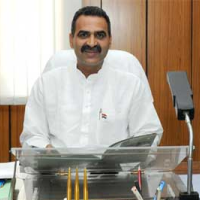New Minister of State for Agriculture Was Earlier Charged With Inciting Communal Enmity in UP
 Sanjeev Kumar Balyan, Minister of State for Agriculture and Food Processing Industries
Sanjeev Kumar Balyan, Minister of State for Agriculture and Food Processing Industries
The NDA administration seems to be following in the footsteps of the previous UPA administration when it comes to appointing ministers with a communal past. If the Congress gave cabinet berths to Sajjan Kumar, Jagdish Tytler and Kamal Nath who were allegedly involved in the anti-Sikh riots of 1984, the new administration’s Minister of State for Agriculture and Food Processing Industries had been booked for inciting communal enmity in Uttar Pradesh in 2013.
When two Hindu men were killed in an altercation with Muslims in Muzaffarnagar district last August, Sanjeev Kumar Balyan had allegedly rallied a crowd of angry young Hindu men to take revenge.
According to the New York Times, the police had listed Balyan as one of 14 politicians who, four days after the deadly brawl, addressed a crowd that was armed with bamboo clubs and sticks. Of these, 12 politicians were affiliated with the Bharatiya Janata Party (BJP), which is in opposition in Uttar Pradesh. Balyan was charged with incitement and jailed as a preventive measure.
A week after the rally, mobs of armed Hindu men rampaged through local villages, leaving around 60 people, mostly Muslims, dead and prompting thousands of Muslim residents to flee their homes.
Muzaffarnagar’s Superintendent of Police Alok Priyadarshi told NYT that the politicians had “turned the situation from bad to worse by whipping up passions.”
In June, investigators charged them with “promoting enmity between different groups on grounds of religion,” and disobeying and obstructing public servants.
In response, Balyan told NYT in an interview that this was “the kind of case which can be slapped against anyone for political reasons.”
The 41-year old claimed that he bore no responsibility for the violence because it broke out when he was in jail. If he had not been behind bars, he said he “would have tried my best to make sure the riots didn’t happen.”
Since the events last summer, the BJP has gone on to win a spectacular victory in the general election held in May. Particularly noteworthy was the party’s performance in Uttar Pradesh where it won 71 out of the 80 parliamentary seats – helped no doubt by the voter polarization that followed the communal riots in Muzaffarnagar.
Prime Minister Narendra Modi had avoided religious issues in his campaign, preferring an economic growth platform that won him the landslide victory.
According to NYT, political analysts believe there are political reasons behind Modi selecting a junior minister with such a controversial past – the position needed to go to a leader of the Jat caste. Balyan was simply in the right place at the right time.
Yet his selection could also be recognition of the important role that local politicians in Uttar Pradesh and particularly Muzaffarnagar played in delivering crucial votes to the BJP.
- Top Stories
- Controversies
- Where is the Money Going?
- India and the World
- Appointments and Resignations
- Unusual News
- Latest News
- India College Chain’s Expansion into U.S. Draws Opposition from Massachusetts Officials over Quality of Education
- Milk Shortages in India Tied to Release of New Movies Featuring Nation’s Favorite Stars
- Confusion Swirls around Kashmir Newspaper Ban in Wake of Violent Street Protests
- Polio-Free for 5 Years, India Launches Vaccine Drive after Polio Strain Discovery
- New Aviation Policy Could Increase Service, Lower Ticket Prices






Comments